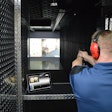As I boarded a flight home from meeting with members of Congress, security was tight and new alerts were announced. I considered again that despite 15 years on the job and being in the virtual ground zero for new terrorist threats, I was unarmed, unable to respond to a threat because out-of-town officers are not trusted to carry guns in the nation's capital.
I couldn't help but think of a recent incident involving an officer just outside of my home state of New York. The officer who was unarmed because he was not legally permitted to carry "off-duty," saw a suspect point a gun at another driver, but he could do nothing but call 911 on his cell phone. The gunman saw him on the phone and responded, putting four shots through the officer's windshield. The officer narrowly survived.
Cops can't agree on much, but the issue of police-active and retired-carrying a concealed gun is probably the single biggest, most universally shared concern of officers nationwide. Whether through my service on the Advisory Board of Police magazine or as a Director for the Law Enforcement Alliance of America (LEAA), the most commonly repeated topic I hear when I meet with officers is, "Can I carry a gun off-duty or retired?" Currently, the answer to this question is complicated as each state has different laws (see "Concealed Carry" on page 36).
But as many of you know, there is a bill in Congress-the "Community Protection Act" (H.R. 218)-that, if passed, would create a federal concealed carry law for off-duty and retired law enforcement officers that would supersede all state laws. The force behind H.R. 218 is LEAA, a membership organization made up of police professionals, crime victims, and concerned citizens.
The fight to pass H.R. 218 has gone on for 10 years since the legislation was first drafted by LEAA and Rep. Randy "Duke" Cunningham (R-Calif.). In the last Congress, we recorded a vote of 372 out of 435 representatives for the bill. But, as often happens in Congress, the bill to which H.R. 218 was attached ultimately failed.
In this session we now have 262 Congressional co-sponsors, well beyond a majority of Congress. In addition, H.R. 218 has the support of 80 police groups.
Since 9-11, the idea of "off-duty" and retired officers being equipped to defend themselves, their families, and their communities is a no-brainer to just about everybody except one powerful man in Congress and a couple of police groups.
Despite the fact that a majority of his colleagues support it, House Judiciary Chairman James Sensenbrenner (R-WI) refuses to grant H.R. 218 a hearing or allow a vote.
Amazingly, H.R. 218 has also been opposed by some police groups. These groups suggest departments will face extra liability for the acts of armed "off-duty" officers and that "on-duty" cops will shoot those who are "off-duty" if H.R. 218 passes.
Both concerns appear well intentioned, but the experiences of cops on the street show that these fears are unfounded. In many, if not most, states, local "off-duty" officers can carry concealed statewide. Stories abound of "off-duty" officers defending themselves or others when faced with armed, violent criminals. Nationally, we are not awash with "friendly fire casualties" caused by "on-duty" officers interacting with armed "off-duty" officers. Not only are armed off-duty and retired officers not a problem, they save lives.
Consider the story of "off-duty" officer Robert Clark who found himself in a school shooting in Santee, Calif. After identifying himself as an "off-duty" officer, Clark drew his gun, confronted the killer, and helped force him to surrender, thereby preventing further death and injury. Without firing a shot, this officer was able to act and save lives.
And it's not just "off-duty" officers that are saving the day; retired officers with guns are saving lives, too. However, retired officers without guns, including a retired police chief from New Jersey, are also being killed.
"No guns for off-duty and retired cops" is not a safe policy. There are far too many cases of cops being targeted for attack simply because they are-or were-police. In the battle between the "good guys" and the "bad guys" the good guys should be allowed to have guns.
Joseph P. DeBergalis is a 15-year veteran of a New York police agency and a member of the Police Advisory Board. He also serves on the national board of directors for the Law Enforcement Alliance of America (LEAA). The opinions expressed in this editorial do not necessarily represent those of his department. For more information about LEAA and H.R. 218, visit www.leaa.org















